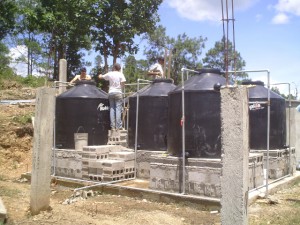
Megan Schultz ’12 and Juan Puerta ’12 speak with the villagers.
A native of Bogotá, Colombia, Juan Puerta ’12 is acutely aware of the problems rural communities face in Latin America, particularly the lack of potable water. His involvement with Lafayette’s chapter of Engineers Without Borders (EWB) is his way of expressing gratitude for the opportunities he’s had.
The chapter has been working for a number of years with local communities in the villages of La Fortuna and El Convento in the Yoro region of northwest Honduras to install a system to deliver clean water from mountain springs to the villages. Several student teams traveled to Honduras in August to build the water treatment subsystem in El Convento and perform maintenance on the water treatment system constructed on a previous trip in La Fortuna. Their travel was funded through contributions from alumni and Air Products & Chemicals, Inc.
Along with Megan Schultz ’12 (Dillsburg, Pa.), a mechanical engineering major, Puerta led the slow sand filtration team in El Convento. Others traveling to the region included civil engineering majors Katie Reinhardt ’12 (Tabernacle, N.J.) and Eduardo Rodriguez ’14 (Santa Tecla, El Salvador), government & law and foreign languages major Claudia Umana ’14 (Washington, D.C.), and Joshua Smith, assistant professor of mechanical engineering. Professional mentors Emils Schnore, a local foreman and tradesman who consulted on construction aspects of the filter, and Reed Colton, a geotechnical engineer who consulted on the filter design, also traveled with them. Each student had a specific job to ensure the team made the most out of the visit.

Students and villagers work on the slow sand filters.
Puerta and Schultz arranged all the logistics to move people from one place to another, ensured timely delivery of building materials, and supervised the construction of the slow sand filters. Reinhardt was charged with getting accurate GPS points on the current pipeline in La Fortuna.
“From an academic standpoint, the work in Honduras follows the same process all other engineering projects in the industry follow, so it was a firsthand experience in that respect,” explains Puerta. “But more than that, it was a very gratifying experience to build something you design and then see how it affects people. Going to the communities lets you see how important the work you do is for them. This project was a small way to return something for all the opportunities I have had in my life and help those not as fortunate.”
Slow sand filtration is a water treatment method in which water passes through several layers of sand and gravel as well as a small biological layer inside storage tanks. Water enters through the top of the tank, passes through all the layers, and exits the bottom as potable water. The biological layer is the first layer, comprised of bacteria and microorganisms found in normal creek water, and is perhaps the most important, as it kills 99% of harmful biological agents in the water. The sand and gravel layers remove suspended particles and sediment.
This was Reinhardt’s first trip to Honduras, and it turned out to be an eye-opening experience. She found a new appreciation for things she used to take for granted, like taking a shower or having a mattress to sleep on at night. EWB’s Honduras project was the perfect opportunity for her to combine her passion for volunteering with the technical know-how she’s gained in the classroom.
“It is an amazing experience,” she says. “All the children that we grow so attached to have a chance to be healthier and not contract water-borne diseases. To know that you’ve changed someone’s life – no less, a community of people – is the most rewarding thing you’ll ever get a chance to do.”
In addition to helping others, the teams also gained invaluable real-world experience. Reinhardt points out that lab exercises usually have only one correct answer, but in Honduras, they had to think creatively to solve open-ended problems and turn theory into function. For Puerta, a mechanical engineering major who has been involved with EWB since his first year, it opened up a whole new vantage point in his field.
“It was a completely different learning experience than class because as a mechanical engineer, I don’t get to learn much about civil engineering,” he says. “This project was completely civil engineering, so I gained a lot of knowledge of another very interesting engineering field.”
The chapter plans to return in March to continue working on the system. In La Fortuna, they will check on its status and build a pre-filtration system to improve efficiency. In El Convento, they will identify where branches from the main pipeline should be located so the villagers can lay the pipeline to each of the 42 homes in the community.


1 Comment
Well done guys, it looks really good! It is amazing that you managed to get everything installed in such little time. Congratulations!
Comments are closed.